The Comedy Backrooms of Three of a Kind
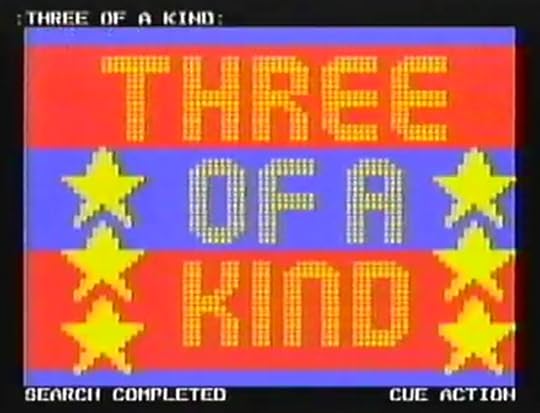
The BBC’s Three of a Kind hails from that enormous pantheon of shows from the eighties — an era packed to the gills with sketch shows and sitcoms — which had a huge audience, but vanished further into the mist with each passing year. Historically, it’s an early showcase of two people who went onto far greater success, and David Copperfield. At the end of its three-year run in ’84, the careers of Lenny Henry and Tracy Ullman would explode, and when the series began, Lenny was only 23, and Ullman 22 — while Copperfield’s a decade their senior. The sheer youthfulness to a viewer now twice their age gives said decrepit-commentator the feel of watching an end of term talent show, like that saying: ‘when the sketch comics start looking young, that’s when you know you’re old’.
With a title which satirises the series’ diversity (one white fella, a woman and a black man), Three of a Kind left no mark outside of a footnote in the biographies of two thirds of its players, a Silver Rose of Montreux winner in its day, but with none of its sketches showing up on clip shows alongside all the Don’t Tell Him Pikes, Four Candles and “Wild? I was absolutely livid!”s. Unlike most of the tat on here, it did get a full release, but I can’t watch something on DVD quality, it’ll hurt my eyes! No, much better to fire up a pair of terrible quality rips, starting with the 1984 VHS, which is a compilation of the first four episodes.

Right away it becomes clear that something’s wrong. Not with the show, but with me. Yet, I must push on, as Lenny’s character tries to pay for petrol while asked for increasing amounts of ID; fingerprints, a marriage licence, a chest x-ray. There’s the Star Trek sketch every show had to do — stacks of them. Cut to Copperfield dressed as a hunchback. “I hate people calling me Quasimodo, it really gets my back up!” I’ve seen this before. Every punchline, every costume. All that’s different are the faces. This is it. I’m here. I’ve finally reached the point there are no new old sketches left. No gags untold. No wigs unseen. I’ve clipped through the screen into television’s equivalent of The Backrooms, left eternally wandering in search of an exit, but around every corner, a doctor’s surgery or travel agents or restaurant; someone dressed as Superman or a punk rocker. A purple mohawk that’s been sat on a dozen snarling heads. These are the liminal spaces of light entertainment, and whichever direction you run, there’s always the muffled “walla walla walla ooh!” of a nearby Grease parody, lurking, waiting. All I can do is vainly search for a way out; for something new.
The show’s chosen aesthetic is Teletext, with the title sequence and captioning done in-house at Ceefax for proper authenticity. The pixelated cast portraits resemble a very poor ZX Spectrum licence, while episodes are peppered with onscreen text gags the quality of Nigel Rees anthologies of humorous graffiti. “I WONDERED WHAT LETHARGIC MEANT, BUT I COULDN’T BE BOTHERED TO LOOK IT UP” and “THE MEEK WILL INHERIT THE EARTH, IF THAT’S O.K. WITH YOU CHAPS.” I’ve compared other shows to televised joke books, but here they’ve actually put one onscreen. “A PERSON SUFFERING WITH KLEPTOMANIA SHOULD TAKE SOMETHING” and “IF IT WASN’T FOR THE PRICE OF PETROL, I’D BE DRIVEN TO DRINK.” Plus, it’s me who’s having to read these. I’m doing all the work! Four of a Kind, they should call it. Budge over, Lenny Henry! “NEW FILM BEING MADE ENTIRELY ON CREDIT… A NIGHTINGALE SANG IN BARCLAYCARD” and “EARS PIERCED WHILE YOU WAIT, IS THERE ANY OTHER WAY?” Having all captions rendered in the same blocky font inadvertently gives everything the look of a funny tape some mates put together in their garage with a camcorder, cut on a home movie suite from Argos.
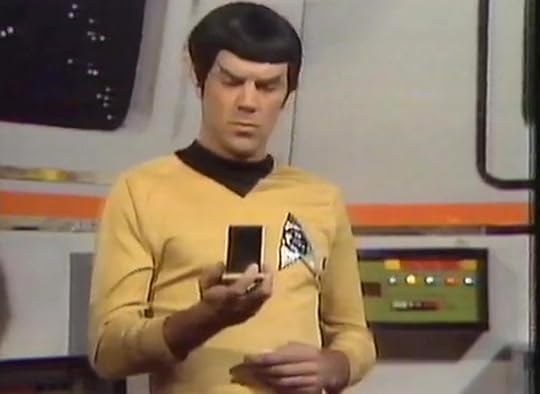
The most interesting figure here is David Copperfield, carrying himself with the grim resignation of a man who, while famous, shares a name with two much better known David Copperfields; one a fictional character. Stubbornly refusing to change it, he’s cursed to forever hear the words “no, not that one,” and had no choice but to lean into it, actually working the cruise line circuit under the billing ‘David Copperfield — Not The Magician’. The angriest man I ever knew was called Tommy Cooper; a life comprised of blowing his top at people going “just like that!” on the daily, and there was even a boy at my school who underwent unimaginable suffering, having lived through the 80s and 90s with the given name Timmy Mallett. Poor Sod. If Copperfield and Ian ‘H’ Hopkins off Steps ever met, they’d need not exchange a word, acknowledging all that shared pain in a simple nod. As a performer, Copperfield fits in that rough-seeming group of comedians, along with Cannon and De Courcey; a boxer’s face and demeanour; squat little physique against the much taller, leaner Lenny Henry. Arms folded like someone shook him awake from a kip on the sofa and pushed him onstage, he seems to gain no joy from his vocation, as though finally acquiescing, albeit with the caveat “Fine, but I’m not doing any voices…”
While I’m riding him for his post-3oaK career, Copperfield did have an episode of a solo vehicle — The Copperfield Company Show — on the BBC in ’84, most notable for one of its writers being a young (though almost-certainly already bald) Lee Hurst, and a nine episode run of kids show Lift Off! With Coppers And Co!, followed by a sitcom styled revamp as Coppers and Co! in ’87. The bio of his after dinner booking site claims he once won BBC’s Television Personality of the Year, but the actual list of winners is impossible to find, so we’ll have to take his word for it. It was probably the magician.
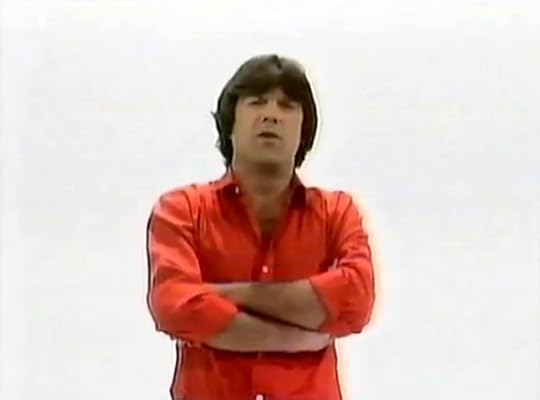
As one of those shows with loads of writers, there’s no unifying voice, and if there is a house style, it’s to make unrelated puns out of absolutely fucking everything. The Alien parody, Nailian, is set onboard the SS Minestromo where “in space, nobody eats ice cream,” and Sooty bursts out of Copperfield’s chest. Half its bits are against a plain white background like Who Do You Do?, and the childlike material kinda makes sense in the 8:30pm ‘you can watch this, but then it’s straight off to bed’ slot. There aren’t a lot of recurring characters, though Lenny’s Delbert Wilkins did get its start here, and as we’ve encountered time and again, it moves at a real clip, with some skits lasting a literal five seconds, maniacally tearing their way through time-and-budget consuming set-ups and costumes. The days when series like this would casually be commissioned for multiple years now seem further away and more fanciful than Manchester Square’s Pig-Faced Lady, or the Dancing Plague. Shall we ever see such times again?
It is that classic blend of both puerile and packed with 80’s socio-political observations; taxi drivers are rude, Sun readers are thick, British Leyland workers are lazy; back in a time when not only did bare breasts appear in newspapers, but a man named David Copperfield could hold one up to the camera while speaking the words “big knockers!” In another moment, Lenny gets mad at cinema usher Ullman for ripping his ticket in half, tearing off her clothes in revenge, and leaving her in bra, knickers and suspenders. You’d get no real indication from watching that either Ullman or Lenny would go on and become massive, though she’s clearly the most adept at characters and accents (with the lads unable to hold onto an accent for an entire sketch), and the only one given long character monologues, entrusted with complicated sections of dialogue which showcase her verbal dexterity, at one point pronouncing that really long town in Wales. It feels like Ullman’s playing characters, while Copperfield particularly is just reciting lines. His bullish aura makes every character sinister; everything played flat and gruff, as though still rehearsing and saving the proper voice for the night, but weirdly it’s a good balance with the youthful chirpiness of the other two.
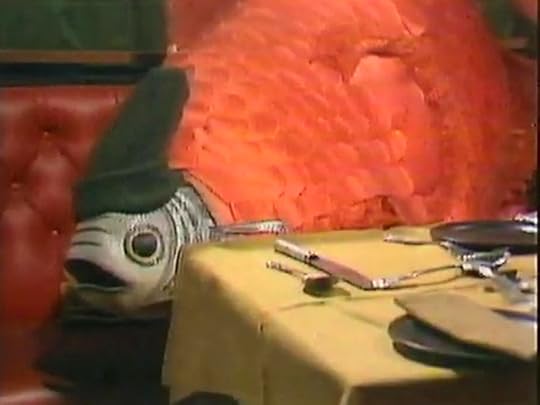
Aside from the puns, if they have a trademark, it’s the comic strip style reveal; Ullman demanding a waiter serve the fish first, and pan to reveal she’s sat across from a gigantic, hungry fish. The costume returns to aid the single worst pun I have ever seen, fish now wearing a woolly hat and talking in a Benny from Crossroads voice about “Miss Alison,” as the title CODS ROES comes onscreen. Whoever wrote that should be singled out on the credits. Name and shame! For balance, I watched 1983’s final episode, preceded by its trailer for Penelope Keith cougar sitcom Sweet Sixteen. The whole ‘get a pun on it!’ philosophy’s really laid bare in Alan Bleasdale parody THE BOYS FROM THAT HORRIBLE BLACK STICKY STUFF THEY PUT ON ROADS, playing like someone trying to discuss a film they’re only pretending to have seen. Lenny’s in a Michael Angelis beard, while Ullman scouses it up about poverty. “All we’ve had to eat is black stuff, we’ve had boiled black stuff, grilled black stuff, black stuff pudding...” The entire sketch is clearly based off that one clip they always show where he kills the chickens, whoever wrote it doing the equivalent of “Seen Blade Runner last night?” “Yeah it was well skill, my favourite bit was when he ran across the blades!”
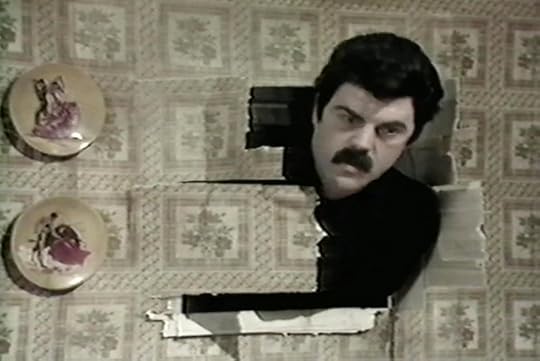
Surprisingly, compared to other black performers in ensembles of the same era — say, Gary Wilmot in Copy Cats — Lenny’s race is never used where his being black is the joke; a reference to be called upon for a cheap laugh. None of the set-ups where he’s part of a couple with Ullman make mention to it, and though he’ll break out a Jamaican accent and dreadlocked wig as, say, community policeman PC Ganja, it’s never pejorative, and Three of a Kind is unusually colour-blind. Ditto the shocking lack of impressions, aside from Lenny’s David Bellamy and Trevor McDonut making their way over from Tiswas, and one sketch where Copperfield’s painter runs through his Tommy Cooper, Hitler (or Freddie Starr as Hitler), and Norman Wisdom (who I initially typoed as Normal Wisdom; a bloke in a perfectly-fitting suit who doesn’t keep laughing and never falls over). It’s all building to the punchline of “what kind of painter is he?” “He’s a Cubist…” with a Ceefax caption, as they don’t trust the audience: “HE’S REALLY AN IMPRESSIONIST — GEDDIT!”
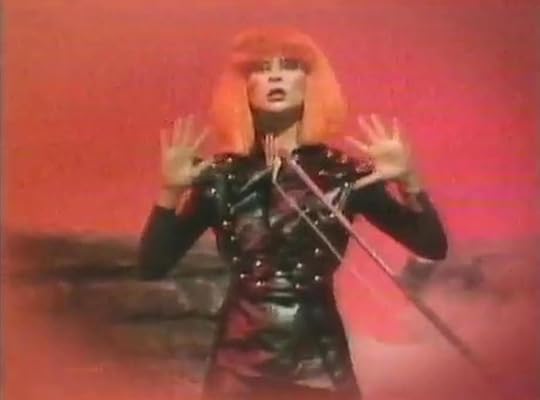
I’m aware I’m doing everything I can to avoid really getting in the weeds of the sketches, which should speak of their quality. Longer ones are generally wordy back-and-forths leading to a stinking pun, the shorter ones outright rubbish, but so brief it doesn’t matter. Lenny’s boxing trainer slaps Copperfield back into consciousness as he groggily asks what happened — “ya tripped over the ropes getting in!” That’s the whole sketch. In another, Lenny bounces a boiled sweet on the floor before eating it, caption THE HARLEM GOBSTOPPERS. Copperfield with a bin on his head speaking with an American accent about movies, caption DUSTBIN HOFFMAN.
But we’ve (or rather, I’ve) seen it all before, travelling this multiverse of dating agencies and football managers and newsreaders and cat food commercials and pub after pub after pub, fully aware the costumes probably have pit-stains leftover from Bobby Davro; wigs with a few thin strands of Russ Abbot’s hair stuck to the inside. This was the decade of music, and weekly guests like Phil Collins, Thin Lizzy and the Boomtown Rats played alongside musical parodies. These parodies are odd in that they neither mimic the style of the performer, nor add any funny lines. Copperfield’s Cliff — “still around after all these years, no wrinkles on my brow” — is so jokeless, it’s almost a straight song, though Ullman does better with Toyah Wilcox take-off Annoyah (“Marti Caine meets Frankenstein”), and Wilcox would later appear as one of the musical guests. David Bellamy closes the VHS with a rap, a Rapper’s Delight soundalike fully winning me over with lines like “to the wythm of the Bellamy wap” and “I’m six feet four with baggy pants and I talk to wunner beans…”
And it’s not like there are no laughs to be had. One particular highlight is a snooker broadcast which has lost its colour, leaving commentator Lenny to describe Cyclone Syd “going for the… light black ball on the left.” Then the colour returns, revealing all the balls are in degradations of grey, “and as I was saying before…” Even one of the Ceefax jokes really made me chuckle – “JUST RELEASED A HORROR FILM AIMED AT PEOPLE WITH BAD GRAMMAR. I WERE A TEENAGE WAS-WOLF.” Though perhaps I liked it because it reminds me of a joke I once wrote which only works when said out loud. ‘Do Scottish wolfmen were under their kilts?’
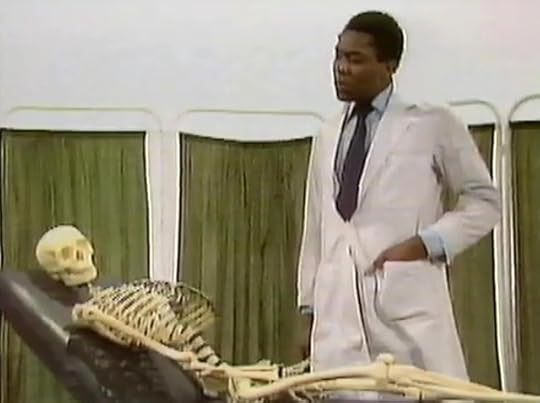
But for every funny bit, there’s gags we’ve all heard a million times before — “I’ve got a Chinese doctor. Half an hour after my operation, I felt like another one.” Regardless, the audience, who’ve not spent the last six years plumbing the depths of sketch comedy, seem to be enjoying it, with Copperfield’s zombie, who’s been playing “warts and crosses” at the cemetery, having to pause while they regain their composure when his rubber hand falls off. Not a smartphone in sight. Just people enjoying the moment; and making audible noises of disgust at cat food or fake blood, unscarred by genocide videos during their morning social media scroll on the toilet, and still capable of feelings. When we get a brief look at the audience, it’s the era when middle-aged men went to tapings in suits and ties, with not a single t-shirt in the whole studio.
Other concepts here would baffle Gen Z viewers, like Lenny as a door-to-door breadman who starts posting it through the letterbox, slice by slice. There’s no credited director, perhaps ashamed of the no-effort, flatly shot style, as though they’re afraid any camera movement might set off an alarm. A rare and sudden overhead shot during the Cliff song has me rearing back out of my seat like those early cinema-goers who thought they were about to get hit by a train. One odd stylistic choice sees every sketch end on a freeze frame, almost always with Lenny pulling a face; that lips pursed, chin-jutting gurn which graced many a cover of the Radio Times.
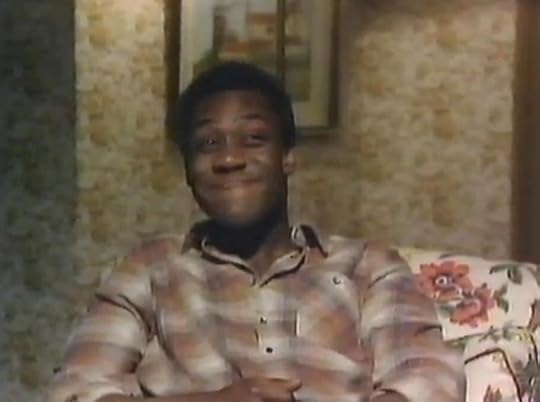
But it’s more things I’m avoiding talking about, because just as I’ve seen it all before, you have heard it. Grown-arse men in bonnets sucking their thumbs as babies. An Australian Blue Peter parody. Copperfield in a hospital bed. Copperfield busking, as he’s asked to accompany Lenny’s policeman — “a one, two, a one two three…” We saw Russ Abbot do that one. We’ve seen all of these in some fashion. One time, they plagiarise two famous sketches simultaneously, with Copperfield as a wrestler wrestling himself — like Graham Chapman — flipping and flailing and putting himself in various holds, while dressed as two people split down the centre depending on which way he’s facing — like Tommy Cooper.
Three of a Kind‘s credited list of writers is extensive, including names like Ben Elton, Ruby Wax, Kim Fuller, Red Dwarf‘s Grant Naylor, Guy Jenkin off Drop the Dead Donkey, Hale and Pace, Nicks Revell and Wilton, satire’s gnome king Ian Hislop, and someone who must’ve had a terrible time at school, Rob Groocock. But this show wasn’t written as much as its ideas were plucked from the cultural ether, from that big cloud where all the eternal sketch show gags bubble away, like if AI consisted of men thrusting their hands into the air and saying to another man who’s sat at a typewriter “What about a doctor’s surgery? Has that been done?”
…
This piece first appeared on my Patreon, where subscribers could read it a month before it landed here. If you’d like to support me for as little as £1 a month, then click here to help provide the world with regular deep dives about weird-bad pop culture, early access to my videos, my podcast, and all kinds of other stuff.
There’s a ton of content, including exclusives that’ll never appear here on the free blog, such as 1970’s British variety-set horror novella, Jangle, and my latest novel, Men of the Loch. Please give my existing books a look too, or if you’re so inclined, sling me a Ko-fi or some PayPal cash.



